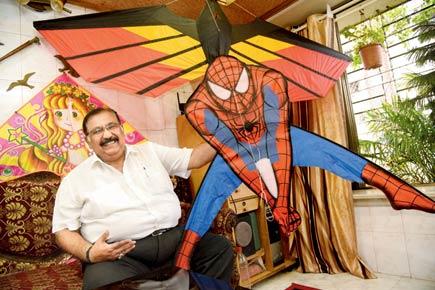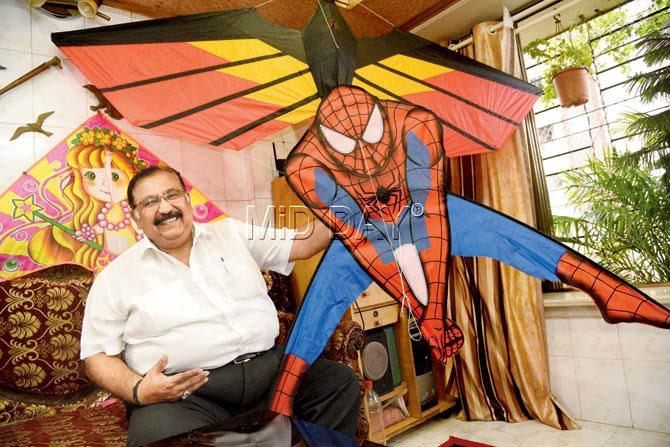Mumbai’s Golden Kite Club will take on participants from 53 countries at the World Cup of Fighter Kites in France next month

Far removed from the raging debate over India’s medal tally at the Rio Olympics, members of Mumbai’s Golden Kite Club are quietly prepping for the World Cup of Fighter Kites to be held in France next month. Shahzaday Abbas, Dilip Kapadia, Abdul Rauf and Hitesh Gramania will fly to Normandy to represent the country at the 16th Dieppe Kite International Festival on September 10. Spread over nine days, the festival is one of the biggest kite-flying events in the world, and will see participants from 53 countries.

Shahzaday Abbas with his specially designed Spiderman kite. Pic/Suresh Karkera
“The last time we won the World Cup was in 1996 at the first Dieppe Kite International Festival. Unfortunately, in the last world cup in 2014, we lost out in the quarter finals,” says captain Abbas, when we meet at his Nagpada home. Abbas is a veteran of the Golden Kite Club, which was established in 1973 by Walkeshwar resident Dilip Kapadia to help kite enthusiasts participate in local, state and all-India kite-cutting competitions. Over the years, the team has participated in several national and international tournaments right from the International Kite Festival organised in Gujarat, to the Great Miniature Kite Contest in Washington DC. “Some of our members are currently at Bondi beach in Sydney for the kite festival organised by the Australian Kiteflyers Society,” he adds.
Hanging on the wall in Abbas’ living room is a giant kite in the shape of Spiderman casting a web, which he has specially designed. “At the festival, there’s no stipulated size for kites. You’ll see giant whales and octopuses floating serenely in the air. It’s quite a sight,” he says.
The team will participate in two events; the fighting kites match and show kites contest. While the former event will test a participant’s strategy to bring down an opponent’s kite, the latter will judge the design and aerodynamics of the kite.
This time at the festival, Abbas, knows the opponents he needs to watch out for. “Brazil and Chile are good at their game. But we have upped our game too. I’ve even lost 10 kg in a month to get back in shape for this competition,” he laughs.
Battle at home, too
Closer home, the main challenge is the declining popularity of kites. “Here, in India, there’s a discussion over banning kite-flying because a lot of birds get entangled and die. This is mainly due to the rampant use of the synthetic Chinese Manja. The kite-flying market prefers these because the tensile strength is higher than cotton’s and, of course, they are cheaper. But, it can slit somebody’s throat,” explains Abbas, adding that the team has always used cotton manjas, as they don’t inflict wounds.
Fellow member, Rauf, has manufactured the kites that the team will carry. “It’s an expensive affair. The paper is imported from Brazil and the glue from Germany,” says Rauf, adding that it took him two days to join eight kites that they will be carrying for the event.
Kapadia (82), president of the club, says the team hasn’t been able to practise since the monsoon began. “We either go to Navi Mumbai or Mira Road every Sunday to practise because in the city, there are no open spaces left. Thanks to skyscrapers, we hardly get a chance to fly kites here,” he says. He also attributes the declining interest in kites to this factor. “Kids, these days, are too busy indoors with their phones, and are not interested in outdoor games,” he rues.
Abbas, who comes from a family of ardent kite fliers of Lucknow, feels it is not child’s play. “It is an ancient sport, dating back to at least 2,000 years. It involves strategy, technique and mind power. We need to change our perception towards the game, and treat it as a sport, not a hobby,” he states, adding that playing the sport that it also has health benefits like reducing anxiety and depression.
20: The number of years since India last won the kite-flying world cup
 Subscribe today by clicking the link and stay updated with the latest news!" Click here!
Subscribe today by clicking the link and stay updated with the latest news!" Click here!









